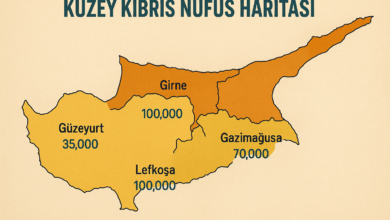
Countries Recognizing the Turkish Republic of Northern Cyprus
Countries Recognizing the Turkish Republic of Northern Cyprus In our article, we will also include the historical background and establishment details. Turkish Republic of Northern Cyprus (TRNC) is a state located in the northern part of the island of Cyprus, which declared its independence in 1983. However, it is only recognized internationally as Turkey is recognized by TRNC's recognition status and its historical, political and legal dimensions are the result of long years of conflict on the island. States recognizing the Turkish Republic of Northern Cyprus Let's move on to our article.
Table of Contents
Historical Background and the Establishment of the TRNC
Cyprus, history It has been a strategic island that has been home to many different cultures and civilizations throughout the world. In 1878, the island was leased to Britain by the Ottoman Empire and became a British colony in 1925. In 1960, it gained independence as the Republic of Cyprus. However, as a result of ethnic tensions and political disputes between the Greek and Turkish communities, the island was divided in two by the Turkish military intervention in 1974. This intervention was carried out to protect the Turkish community living in Cyprus and was also a reaction to a coup attempt backed by the Greek junta.
On November 15, 1983, the Turkish Republic of Northern Cyprus was declared an independent state by the Turkish Cypriot community. However, this declaration was condemned by the UN Security Council and not widely recognized by the international community. Instead, the status of the TRNC has remained a contentious issue under international law.
International Recognition and Legal Status
The independence of the TRNC is a complex situation in terms of international law and diplomacy. Recognition of states is often treated as a political and legal issue. Recognition of a state means that other states accept its existence and sovereignty. However, in the case of the TRNC, this recognition has only been granted by Turkey. UN Security Council Resolutions 541 and 550 invalidated the TRNC's declaration of independence and called on other countries not to recognize it.
The fact that the TRNC is recognized only by Turkey has left it isolated internationally. This limits the TRNC's capacity to establish diplomatic relations, join international organizations and trade worldwide. For example, TRNC citizens may face difficulties in international travel and business transactions because their passports and other official documents are not recognized by many countries.
Political and Social Dimensions
The non-recognition of the TRNC also contributes to the continued division of the island. Turks living in Northern Cyprus feel isolated and excluded from the world community. This can negatively affect their social and economic development. At the same time, the search for peace and reconciliation between the Greek and Turkish communities is made more difficult by this non-recognition.
Relations between Turkey and TRNC
Turkey is the biggest supporter and ally of the TRNC. Turkey supports the TRNC economically, militarily and politically. Turkey's recognition of the TRNC plays an important role due to both historical ties and strategic interests. Turkey also sees the Cyprus issue as an issue related to its national security and energy resources in the Eastern Mediterranean.
The recognition status of the Turkish Republic of Northern Cyprus is closely related to the solution of the Cyprus problem. The lack of international recognition of the TRNC makes it difficult to find a lasting peace and solution on the island. This is an important factor affecting the future of both the TRNC and the Greek Cypriot side. The efforts of the international community and interested parties to find a just and lasting solution to the Cyprus issue are ongoing and the status of the TRNC is of critical importance in this process.
The question of international recognition of the TRNC is a reflection of the historical and political complexity of the island of Cyprus. This complexity remains one of the greatest obstacles to the search for peace and stability in Cyprus. However, despite this challenge, all communities and states on the island need to work towards a peaceful and lasting settlement.



